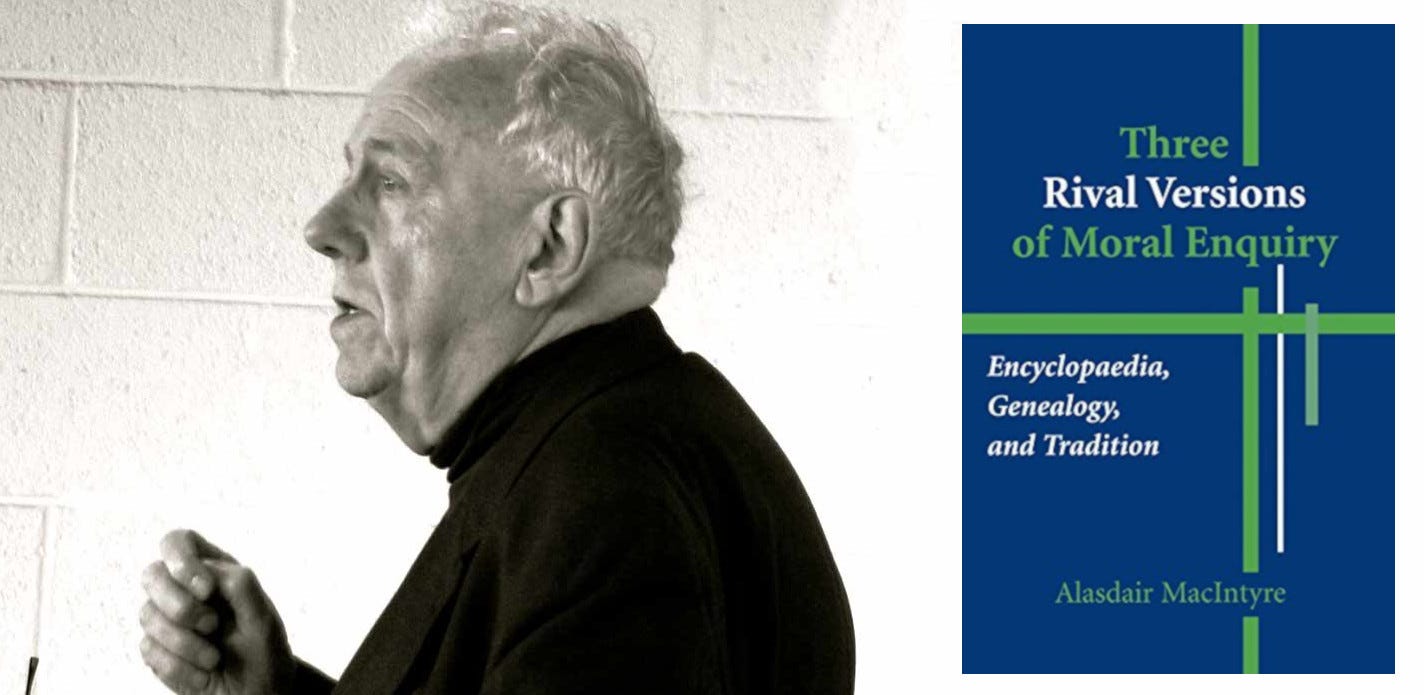After Universities
If academia is no longer capable of conducting meaningful collective enquiries, universities have ensured their own obsolescence.
“What are accepted as the de facto standards of argumentative justification in the established forums of political and bureaucratic negotiation are to a remarkable degree now protected against subversive challenge because the legitimacy of any particular challenge is measured by those self-same standards.”
- Alasdair MacIntyre, Three Rival Versions of Moral Enquiry
If I offer an image of what the university ought to be, it can be struck down immediately - regardless of what I might say. If I advance my claim as a matter of fact, it will be struck down by the objection that what ‘ought to be’ is not a factual matter. If I advance it as a matter of values, it will be cast out by means of a sharp critique, most likely by reducing the question to a matter of mere power relations. If I advance it as a matter of tradition, it will not even be necessary to refute me, as discussion will be foreclosed.
These three objections correspond to the three rival versions of enquiry that Alasdair MacIntyre explored in his 1987 Gifford Lectures. First, we have the tradition of the encyclopaedia, that claims to provide an ordered completeness to knowledge. Second, the tradition of genealogy, Nietzsche’s bad boy, picked up by Michel Foucault, and prevalent throughout contemporary universities as critique. Lastly, there is the tradition of... tradition. Which is to say, the intellectual practices of the Catholic church, which framed the dominant forms of thought at universities for nearly a millennia.
The opening quote by MacIntyre suggests that subversion of the ruling political order has become impossible because the prevailing standards of justification prevent all attempts to change the means of engagement. On the battlefield of ‘facts’, the politically-authorised encyclopaedia (‘the experts’, ‘the science’) will claim home field advantage. In this regard, I wonder if MacIntyre is as surprised as I am that certain critical claims have been elevated to prominent roles at universities as if these were somehow congruent with the dominant encyclopaedic paradigm of knowledge…
MacIntyre’s devastating take down of encyclopaedia and critique remain remarkable even if, as is my case, you have never belonged to the Catholic tradition. As he makes clear, the Ninth Edition of the Encyclopaedia Britannica was able to present a unitary vision of knowledge precisely because its authors were united by a theological understanding where each field was a fragment of a greater whole. The retreat from religious traditions removed even the possibility of asserting this kind of justification - and in its absence, literally nothing appeared to take its place. Universities remain structured as if we still believed in this unity... and few have noticed the incoherence that results from lacking any method to unite disparate fields. Without it, an encyclopaedia is merely an almanac.
Meanwhile, critique undermines all the assumptions underpinning any encyclopaedic project, whether in the nineteenth century style or today’s Wikipedia. Yet critique is a means of undermining, it provides no alternative of its own, which is why the uneasy alliance between encyclopaedia and critique is so absurd. Thus university academics bizarrely espouse versions of gender or race critique while feigning the authority of the encyclopaedia - a misguidedly partisan political project that is as comical as it is fractious.
Any attempt to ground the image of the university upon valorising research is doomed: the ghosts of the Ninth Edition still haunt the encyclopaedia today. Neither are attempts to explain the university as a scholarly community plausible in the wake of our naïve acquiescence to online learning. Nor indeed can any credibility survive that stark overnight coup when administrators across the United States usurped ownership of the bodies of both staff and students. They knew better than the academic community they were supposed to serve, and scurrilously claimed the authority of the encyclopaedia even in a situation where there was no knowledge because the required research had never been adequately conducted!
Without shared standards of argumentation, all debate is inconclusive. There can be no universities in such a world. The very name ‘university’ implies a unity of knowledge now rendered utterly impossible by the belligerent fragmentation that has segregated the available forms of enquiry. The only remaining option is that ‘university’ is merely another profit centre slaved to the utility of industry, which pragmatically has become the case. Given the choice, however, I would rather accept the challenge of asking: what is the fate of knowledge after universities...?






Thank you Asa and Chris for the public dialogue. Fortunately, I think, I have only the foggiest notion about what you are talking about!
"Thus university academics bizarrely espouse versions of gender or race critique while feigning the authority of the encyclopaedia - a misguidedly partisan political project that is as comical as it is fractious." - Great insight. Much enjoyed. Those persnickety inconsistencies... and so arrogantly held despite wise folk trying to get through in every generation. The worst are indeed "full of passionate intensity." A substack meme pointed out the other day how followers of gender theory today will tell you that genitalia do not determine gender, but that surgery to remove (or add) genitalia is desirable (if not necessary) to establish one's gender. How are these two ideas part of the same paradigm?